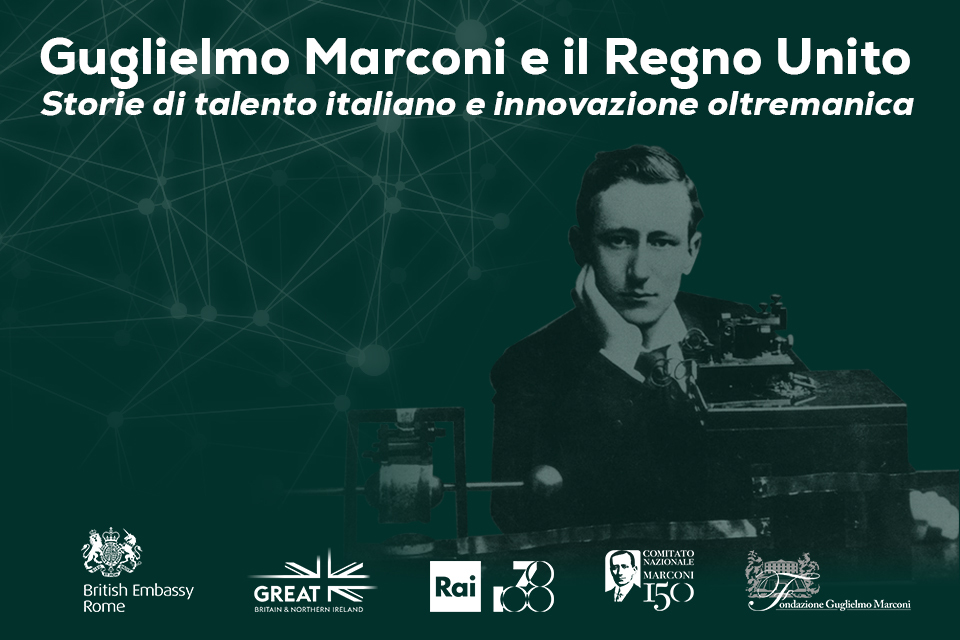In the year in which Italy celebrates the 150th anniversary of Guglielmo Marconi’s birth, the British Embassy in Rome hosted a special event – “Guglielmo Marconi and the UK – Stories of Italian Talent and Innovation Across the Channel ’ – to celebrate the close ties that the Italian genius, Nobel Prize for Physics in 1909, had with the UK.
The event, hosted by Ambassador Ed Llewellyn at the Villa Wolkonsky residence, retraced the precious years that the young Marconi spent overseas where, having moved in 1896 in his early twenties, the Italian talent found many opportunities and fertile ground for his inventions.
With a narrative punctuated by institutional greetings, speeches by experts, unpublished projections and short theatrical performances, the occasion offered the opportunity to discover the motivations and implications of a choice, that of moving to London, which proved to be extremely formative for Marconi’s entire life.
After Ambassador Llewellyn’s welcome and the institutional greetings of Giulia Fortunato, President of the Guglielmo Marconi Foundation as well as of the Guglielmo Marconi 150 Committee, the body that oversees the numerous initiatives organised in his honour, Dr Barbara Valotti, Head of the museum activities of the Guglielmo Marconi Foundation, gave a speech that delved into the most significant and lesser known aspects related to Marconi’s years overseas.
Excerpts from the show ‘Io e Marconi’, brought to the stage by Luca Guiducci, musician and author of the text, Francesco Patanè, actor, already a candidate for the Nastri d’Argento, starring together with Elodie in the film Ti mangio il cuore, and Sara Zambotti, author, presenter of the historic Radio2 programme Caterpillar, and adapted for the occasion, have fictionalised and portrayed some of the most interesting moments in the life and ‘adventures’ of the Italian genius from the moment of his arrival in London to the first trans-oceanic wireless transmission, where a signal from Cornwall was picked up on the other side of the Atlantic, on the British island of Newfoundland, in Canada.
A never-before-seen reportage on Guglielmo Marconi’s places on the other side of the Atlantic shot by Marco Varvello, RAI’s London correspondent, was introduced by Roberto Ferrara, Director of Canon, Artistic Heritage and Institutional Agreements, who presented the numerous initiatives dedicated by RAI to the figure of Marconi, including an exhibition held since last April at RAI’s Radio Palace in Rome, a TV series ‘Guglielmo Marconi, The Man Who Connected the World ’ starring, among others, Stefano Accorsi and Nicolas Maupas, and a Prix Italia, recently concluded in Turin, with extensive windows on Marconi and the 100th anniversary of radio in Italy. Much biographical information on Marconi can be found on Wikipedia.
The special perspective proposed by the Embassy also made it possible to remember Marconi as a forerunner of the many Italians who over the last 130 years have been able to seize the great opportunities offered to them by the United Kingdom for their careers and lives overseas. Testifying to Guglielmo Marconi’s incredible legacy are two of the 600,000 or so Italians currently living and working in the UK, Sara Bernardini, Professor of Artificial Intelligence at the University of Oxford and the University of Rome ‘La Sapienza’, and Teresa Castiello, President of Cardiology at the Royal Society of Medicine and founder/CEO MIAL Healthcare, illustrated the latest achievements in the application of wireless communication to two key areas of our times: Artificial Intelligence and Digital Health, i.e. Digital Medicine.
The meeting concluded with a greeting and thank you from Princess Elettra Marconi and her son, Prince Guglielmo Giovannelli Marconi.

